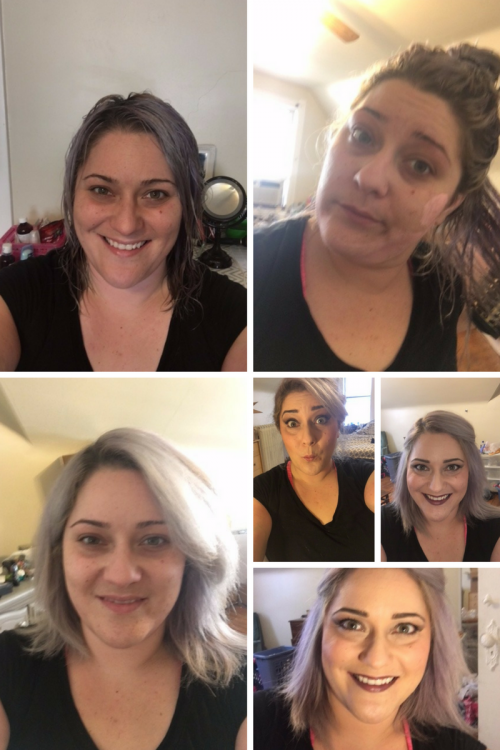My Love/Hate Relationship With Makeup as a Chronically Ill Woman
I love makeup. I always have.
I remember as a young girl watching my mom, my aunts, and my grandmother applying makeup while they were getting ready for the day. I would sit in the bathroom, on the toilet seat or the edge of the tub, and watch them apply the layers of pigmented magic to their faces.
First, they went completely monochrome with liquid foundation, and then one by one they brought to life the individual features of their faces. Some blush (or rouge for those who remember) to brighten up their cheeks, eye shadow and mascara would make their eyes come back from the monochrome abyss, and finally lipstick, never complete until you used one single sheet of toilet paper to dab off the excess, leaving their kisses behind in the bathroom trash each day when they left.
I would always ask to wear makeup and usually got the answer of, “You’re still young and beautiful, you don’t need it.” Which was meant as a compliment, but also hid in that statement a truth I would later find out about how I was expected to appear. Sometimes I would get swooshed over with an empty brush for fun or told by my great-grandmother that young girls could just pinch their cheeks and that’s all they needed.
When I finally was allowed to purchase my own makeup, I did so with reckless abandon and made every mistake a teenage girl could. Caked-on foundation that never matched, raccoon eyes, glitter — need I say more? As I “aged” as a woman, my makeup tastes went from those that I could get at the corner drugstore to those I would save whole paychecks to buy at specialty stores.
My bathroom filled with pretty jars of “lotions and potions” to moisturize, cleanse, purify, mattify, add glow, slow the signs of aging, speed up the repair process, and turn my face into a picture of beauty and youth. My products lined up in perfection, starting to resemble the lab of a mad scientist more than a bathroom of an intelligent, career-focused women.
I loved the ritual of applying makeup, that time when it’s only you and the mirror and you can decide how the world will see you that day. I still do love it. And at the same time I hate it just as much. When you are chronically ill the world looks at you differently. You are held to a different and oftentimes double standard when it comes to the way you look.
When you are sick you are supposed to look like you are sick, right? Puffy eyes, red nose, sallow skin, dull eyes, messy hair, and clothes you would never think to wear in public. You sit on the couch or lay in bed wrapped in your favorite blanket with your perfect “woe is me” face on. You sit in a chair and rub your temples, rub your hands, your knees, or any part of you that may hurt. At least that’s what the media and society tell us being sick is like.
When you are well you are glowing, your hair is shiny, your features perfectly defined. Your clothes fit with ease because you are well, not bloated in the middle or restricted on which shoes or jewelry you can wear that day. You are happy and the wind hits your hair in just the perfect was as you walk head first into your busy day that it doesn’t even get in your eyes or stuck to your lip gloss.
What if I told you life for those who are chronically ill doesn’t follow this neat distinction between sick and well? We are expected to look well and continue on even when we are sick. And if we dare look sick, then we get asked if we are capable.
I know this firsthand. I had returned from an extended medical leave after a nasty episode of uveitis and optic neuritis, and on my first day back was told by my boss, the CEO, that I looked terrible. She told me looking sick would make others in the company doubt my ability to do my job. The next day I managed to wake up early and apply makeup, and upon arriving to work was told by my boss she was glad I was feeling better. I wasn’t feeling better, I had just perfectly applied a mask.
So we put on our makeup and try to fit in and head straight from work to our doctor’s appointment. We are exhausted and surprised that we and our shellacked face have made it this far. The doctor comes in and we hear the dreaded words, you don’t look that sick. You still have color to your complexion and you made it through work just fine.
For me the difference in appearing sick or well is makeup. I am sick every single day. Nothing will change that, but makeup does change how I appear to the outside world, both to my benefit and detriment. So, for the first time I am going to share what I look like before makeup, during the process, and after.

And as a side note, I made it a point to smile in both my before and after pictures because I hate the sad before and then super happy picture once someone has makeup on. That’s not my reality. I’m me with the feelings and emotions that I have regardless of how my face looks. Does makeup make me feel better about myself? That’s tricky; my depression, and anxiety, and disordered eating doesn’t go away, but I do know that with makeup I can maneuver through this world a little easier, and who wouldn’t want that?
We want to hear your story. Become a Mighty contributor here.

